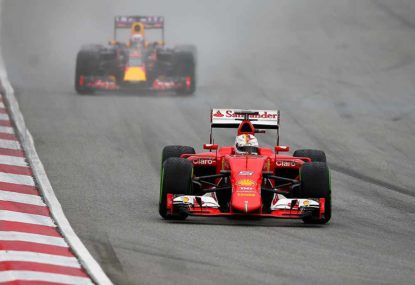Japanese Grand Prix talking points: Verstappen returns to winning ways as Perez solidifies grip on Red Bull seat
Red Bull and Max Verstappen vaulted right back to the top of the charts with a win in Suzuka, after his DNF in Melbourne.

Oh what a difference two cylinders make. The fervour with which the V6 versus V8 engine argument is being debated implies there could be no more meaningful juncture in the history of motorsport than this.
The conservatives scream that the V6 engine is singlehandedly driving away the Formula One television audience, which declined by a whopping 175 million viewers, or almost 30 per cent, over the last six years – though never mind the engine was introduced only last season.
The revolutionaries, on the other hand, demand that Formula One fulfil its role as the pinnacle motorsport category by featuring cutting-edge motorsport technology.
Fighting has raged on for years – well before the engines were actually introduced – and shows no real sign of abating.
The only thing known for certain is that Mercedes, Renault, and presumably Honda have tied their involvement in the sport to the continuation of the hybrid V6 turbocharged engines. Ferrari, in its nonchalant Italian style, is noncommittal.
Yet the arguing persists, perpetuated largely at the behest of one Bernard Ecclestone, who claims the new technology was never any good for the show in the first place.
On this he has a point. The fans – playing the part of whatever bodily fluid is the second most important after blood, which would presumably be played by money in the case of Formula One – must be brought along with any change as significant as this, and in this case they seem largely divided.
Though this writer places himself firmly in the V6 camp, there is a certain magic to the howls generated by the old naturally aspirated engines of yesteryear – but then I also like the sound of typewriters, so go figure.
But a reversal, or at very least a dilution, of the power unit formula is being broached by that political hot potato that is cost control. With no real action on this front at all at any point in the last five years, now is suddenly the time to spring into action on behalf of the sport’s have-nots.
Roughly speaking, the V8 engine budget per team was in the vicinity of $14 million, while the current specification demands a budget of something nearing $40 million.
These new engines simply cost too much, and they are therefore contributing to the unbearable burden on the sport’s smallest teams – though rarely mentioned is that the cost of the V8 engine was kept artificially low by suppliers in an agreement with the Mosley-led FIA last decade.
The (alternative) solution to the problem, as suggested by Ecclestone and echoed by a small chorus of small team leaders, is to reintroduce the V8 engine, supplied by an independent manufacturer, to race alongside the modern V6s.
Assuming, as one must for this argument to make sense, the FIA demands a similar engine cost cap on this supplier, manufacturers of the hybrid V6 could spend what they like in the knowledge that each unit will be sold exclusively to the paddock’s well-heeled clients.
However, as is Formula One’s way, we must first make a number of concessions.
We must ignore the fact that the sport’s biggest teams threatened to quit Formula One altogether when former president Max Mosley suggested some teams compete under a slightly different set of regulations in exchange for operating under his budget cap.
We must ignore that the sport would be effectively admitting that it has been left derelict by the financial mismanagement of the commercial rights holder and forced half of its grid on what will be publicly acknowledged as the *lesser* engine formula.
We must ignore the corporate risk, and associated deterrence factor, involved in entering a sport in which your product has a chance of being beaten by a bargain basement, off-the-shelf V8 engine originating from the last decade.
Only after we commit these acts of denial can we accept that concurrent engines might be a good idea.
There is a way to pull it off, however, and it gives Formula One the opportunity to keep itself on the forefront of engine development rather than having it keep one foot out the door. Rather than manage costs by supplying what is effectively a control, outdated engine, the sport can create an environment for a thriving free market.
Why not open up engine regulations completely? Set a fuel flow limit, displacement figure and standard mounting points, and allow any manufacturer to build any engine they like and compete for the business of the teams to sell their wares.
Creating a rich and poor engine brings the sport no value – but if Ferrari wants to bring back a V10 engine to compete against a Renault twin-turbo four-cylinder hybrid, so be it. If Mercedes wants to pit its ERS-enabled V6 turbo against, say, a car powered by an Audi turbo-diesel, let it be so.
The conservatives will be happy to have a rich variety of noise back in Formula One, and the revolutionaries will be satisfied with the sport’s technological progress. If the environment is right, manufacturers will invest in the neatly-packaged marketing vehicle that is Formula One. It’s win-win.
But then sometimes win-win just doesn’t seem to be Formula One’s thing, does it?
@MichaelLamonato is on Twitter, if you’re into that sort of thing. No pressure.